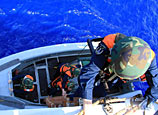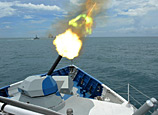
PYONGYANG, April 18 (Xinhua) -- The National Defense Commission of the Democratic People's Republic of Korea (DPRK) on Thursday listed conditions for resuming talks with Washington and Seoul amid festering tensions on the Korean Peninsula.
The commission urged the United States and South Korea to stop provocations, fully apologize for their aggressions, and give assurances not to carry out nuclear war games designed to intimidate the DPRK, according to the official KCNA news agency.
It also urged Washington and Seoul to withdraw nuclear weapons stationed in and around South Korea, and refrain from redeploying them, if they want to reopen negotiations with Pyongyang.
The statement followed months of super tensions on the Korean Peninsula after the United Nations Security Council imposed fresh sanctions against Pyongyang last month after it conducted a third nuclear test in February.
The United States and South Korea have since carried out intensive war games in and around South Korea, including sending B-52 strategic heavy bombers and B-2 stealth bombers to South Korea, apparently in a show of force.
These moves have led the DPRK to make repeated threats of war, which spooked many in and outside the region.
The statement noted that though the United States and South Korea have expressed the willingness to defuse the crisis through negotiations and diplomatic efforts, they have set preconditions for restarting talks with Pyongyang.
On April 11, U.S. President Barack Obama urged the DPRK to end its "belligerent approach," saying that the U.S. will continue to try to work to resolve the DPRK issues "diplomatically."
Meanwhile, South Korean President Park Geun-hye said Seoul hoped to resolve the political deadlock with its northern neighbor through dialogue and would provide humanitarian aids to Pyongyang.
The statement rebuked assertions made by Washington and Seoul that blamed the so-called "provocations" and "threats" of the DPRK as an obstacle in reopening negotiations.
It also said the situation on the Korean Peninsula is directly linked with the peace and stability in northeast Asia and the world, and the DPRK's military and its people will closely monitor future actions of the United States and its "followers."
China, a close neighbor of the Korean Peninsula, has long called on all sides to exercise restraint and stop tit-for-tat strategies to avoid further escalations of the situation.
Amid festering tensions on the Korean Peninsula, Chinese leaders have warned against stirring chaos at the country's doorsteps.
Chinese Premier Li Keqiang said Saturday that trouble-making on the Korean Peninsula issue would harm the interests of all the parties involved.
"To do that is nothing different from lifting a rock only to drop it on one's own toes," Li said in his meeting with visiting U.S. Secretary of State John Kerry.
"The parties involved should shoulder their responsibilities and be ready to bear the consequence to safeguard the regional peace and stability," Li added.
Chinese Foreign Minister Wang Yi on April 13 called for denuclearization, peace and dialogue on the Korean Peninsula, when he met with Kerry.
"China's stance on the Korean Peninsula is consistent. No matter what happens, China will stick to denuclearization and peace on the peninsula and settling the issue through dialogue," Wang said.
Stressing that China is seriously concerned about the situation, Wang urged related parties to refrain from any act that may escalate the tension and called for restoring the Six-Party talks.
Wang called for the parties to have dialogue, improve relations, build trust, jointly promote the denuclearization of the peninsula and attain lasting peace in northeast Asia.
He underscored China's unremitting efforts towards this goal.
















 A father posed nude at an art studio, to raise money for his children's medical expenses
A father posed nude at an art studio, to raise money for his children's medical expenses


![]()
